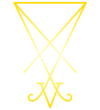Marsilio Ficino
High Priest
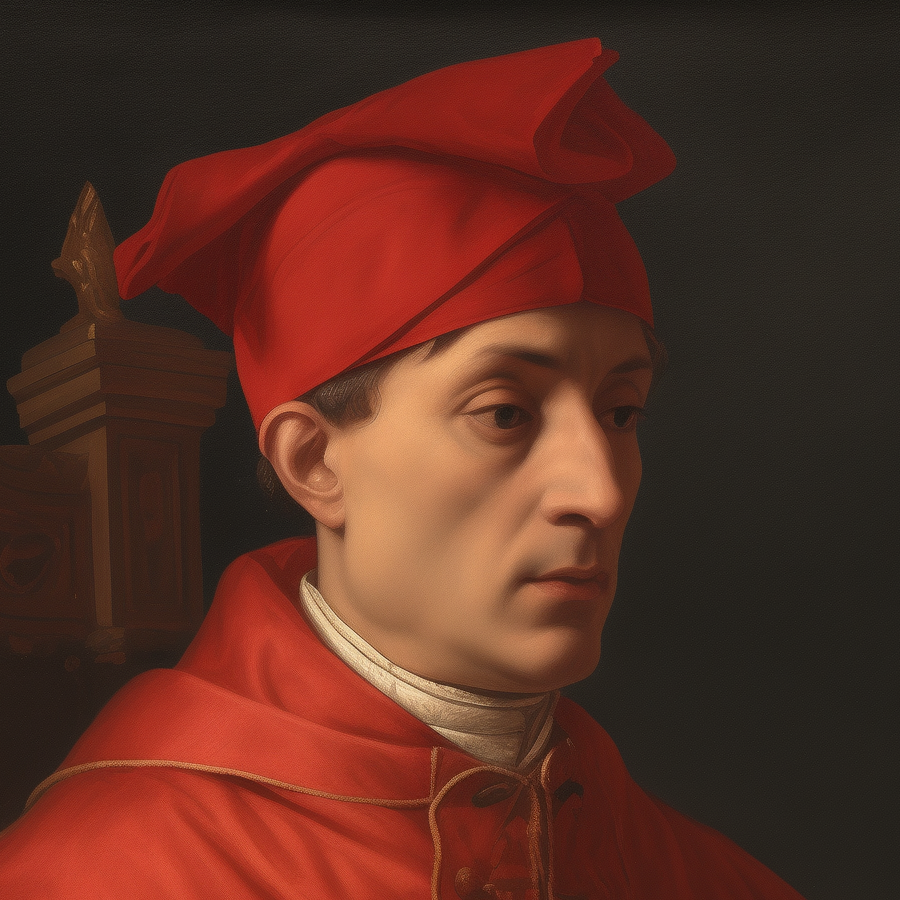
Marsilio Ficino was born on the 19th of October in the year 1433 in a village named Figline Valdarno, on the outskirts of Florence. His father, Diotifeci d’Agnolo di Giusto, was a doctor serving the esteemed Medici rulers of Florence and served as the state physician to Cosimo de Medici on a regular basis. The Medici family were interested in the matters of Antiquity to a very great extent.
THE YOUNG PRIEST
The young boy was primed during his youth to be a doctor, following in the shadow of his father. To that end, much of his early youth was spent practicing medicine under the watchful eye of his tutors, yet paradoxically he was also bombarded by illness. Marsilio, according to the standards of the time, was also trained in Astrological doctrines related to medicine such as decembiture. He learned Latin from the tutor Luca de Bernadi and rudiments of Ancient Greek at a very young age, the latter being a very novel innovation for members of the nobility of Europe. Even the style of the Latin he used was in note-perfect emulation of Classical writers.
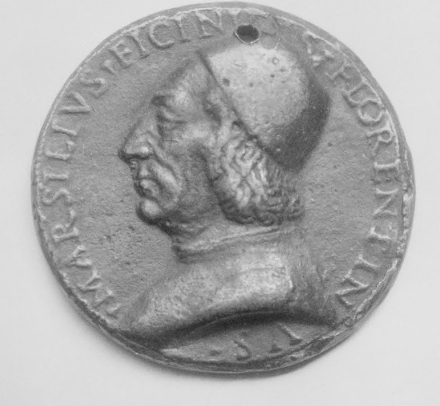
Ficino’s mother, Alessandra di Nanoccio, was not entirely normal. She had strange powers of precognition and even informed Ficino’s father on the day said incident occurred that he would fall from a horse and that a nurse under his employ would brazenly murder her own infant. Ficino would later allege she was so pure of soul that she could project out of her own body. The strange abilities exhibited by his mother and grandmother already put the young Marsilio into a questioning state of mind.
ARISTOTLE AND PLATO
In his later boyhood, he became acquainted with the writings of Aristotle, a perennial influence on his thought. Aristotle had been interpreted by Thomas Aquinas in the scholastic tradition and used as a benchmark for Christian thought for centuries, yet Ficino saw blatant contradictions in this. During this time, due to Petrarch’s influence, the writings of Aristotle took on new scholarly dimensions in Bologna and nearby Florence, abetted by the flow of those fleeing the rapidly collapsing Byzantine state with new editions of Aristotle’s works in Greek and Arabic. One such individual, Plethon, had given a lecture on the merits of Plato in Florence in a scholarly language that the Catholic audience found hostile, as this was at a convention held to re-unite the Catholic and Orthodox Church.
Ficino wrote his first philosophical treatise at eighteen and published it at age twenty-one, making him an exceptionally precocious figure. He began to perfect his knowledge of Greek a year later and became something of an authority in the subject by his late twenties. During this time, he came across Plato, whose writings fascinated him. The ruler of Florence, Cosimo de Medici, who was looking to establish some sort of institution or discussion circle to interpret Plato, took greater notice of Ficino in his greater circle and gave him a villa in relative secrecy at Careggi, bestowing him with several Greek manuscripts he wished to be deciphered. His success in this task made him an indispensable asset.
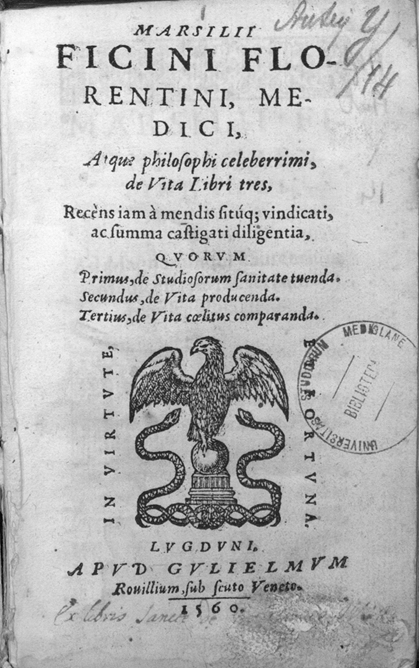
While in contact with the impresarios of the Church as an adolescent after being installed as a seminarian by his father, he found the doctrines to be stifling and found something hollow, barren and fundamentally unloving about Christianity, a profound spiritual disappointment to him. His internal evaluation of this religion opened the door through access to occult texts and meditative practices to other entities, ones that left a profound impression. Yet in the vow he made to these mysterious voices, Ficino also knew that to go beyond Christianity he needed to go deeper into the Church and cultivate his contacts within it, as at the time it was the controller of all information. He knew the weight of his magnificence and intelligence came with a specific design in mind.
ORDAINMENT
Ficino was ordained as a priest at the exceptionally advanced age of forty years, demonstrating his reticence to play this role. Always an exceptionally active individual, he balanced the role of attending to his parishioners with writing his philosophical treatises, translating the Ancients, holding court as an intellectual, being a tutor of Cosimo’s grandsons Lorenzo and Giuliano and attending to his ailing mother and father; their problems in health informed his writings on healing.
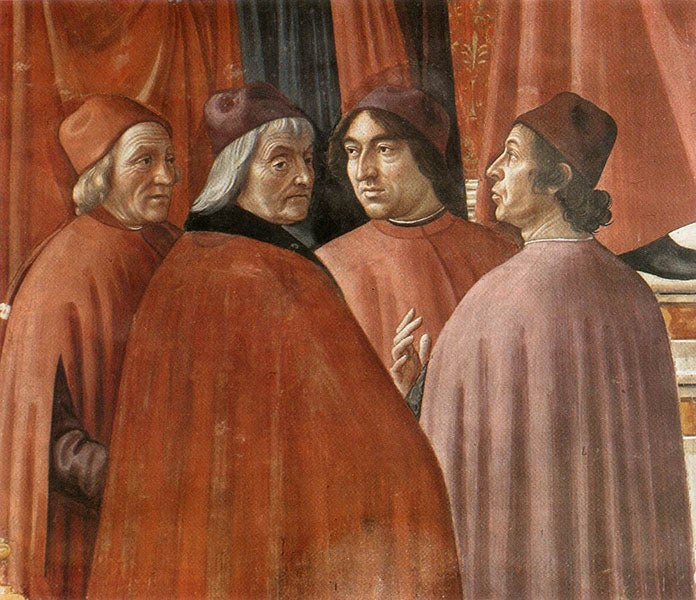
foreground of Angel Appearing to Zechariah, Domenico Ghirlandaio, Tornabuoni Chapel, Santa Maria Novella, Florence
With time, nearly every scholar of some note made the acquaintance of Ficino and he acquired something of a legendary reputation within Italy. Always his closest associate was the poet and scholar Poliziano, himself a Greek translator of some renown. There were others, such as the famous occult scholar Pico della Mirandola, someone who would later become a great disappointment to Ficino.
In his theological works discussing the role of a Catholic priest, he attempts to subvert the meaning of Catholic priesthood by claiming priests should be trained medically to heal the sick and to use ‘healing words’ in emulation of the Egyptian priesthood, which any Zevist should understand the meaning of. It is known from the record Ficino was greatly impressed by the discussion of Asclepius and had read much on the subject of this God from Apuleius and other authors. Strangely, he draws on clearly pagan examples to support his position:
Among the Egyptians and the Persians, the same men were both priests and doctors... The priests of the Egyptians, most ancient of races, were without exception outstanding physicians… The Persian magi or priests… [wrote] countless books to safeguard our health.1
In a letter that has been characterized as strange to say the least, Ficino went on record as telling another priest that God dwells "within them" and that they possess supernatural powers that can be drawn upon from contemplation.
Unusually for the time, all of Ficino’s medical treatises and even his treatises of priesthood linked to medicine do not characterize disease as a consequence of sin but as an ailment of the
soul manifesting clearly in the body, a contention clearly borrowed from Hippocrates, who wrote "the care of the soul and body are one"
and alluded to also by
Plato. Our position on this at the Temple of Zeus is identical.
When recommending the quality of an ideal priest, he specifically put ‘learning’ before devotion to the Nazarene, following on from the Platonic contention that learning reforms the soul and brings one out of an animal-like state. Certain books, while hailing Ficino as a ‘devout Christian’, contradict themselves and admit he was not:
For Ficino the path to gnosis, though perfected by Plato, had a distant origin, and he revived and refined the ancient notion of a secret, esoteric, and what Steuco would later call perennial wisdom, a Prisca theologia…
A hexad, indeed, was such an authoritative category for charting the gentile succession of sages that Ficino had to adjust its members, since he had many more sages than slots available for them, but he eventually decided on Zoroaster, Hermes Trismegistus, Orpheus, Aglaophemus, Pythagoras and Plato.
Marsilio Ficino, His Theology, His Philosophy, His Legacy, Michael J.B. Allen, Valery Rees, Martin Davies
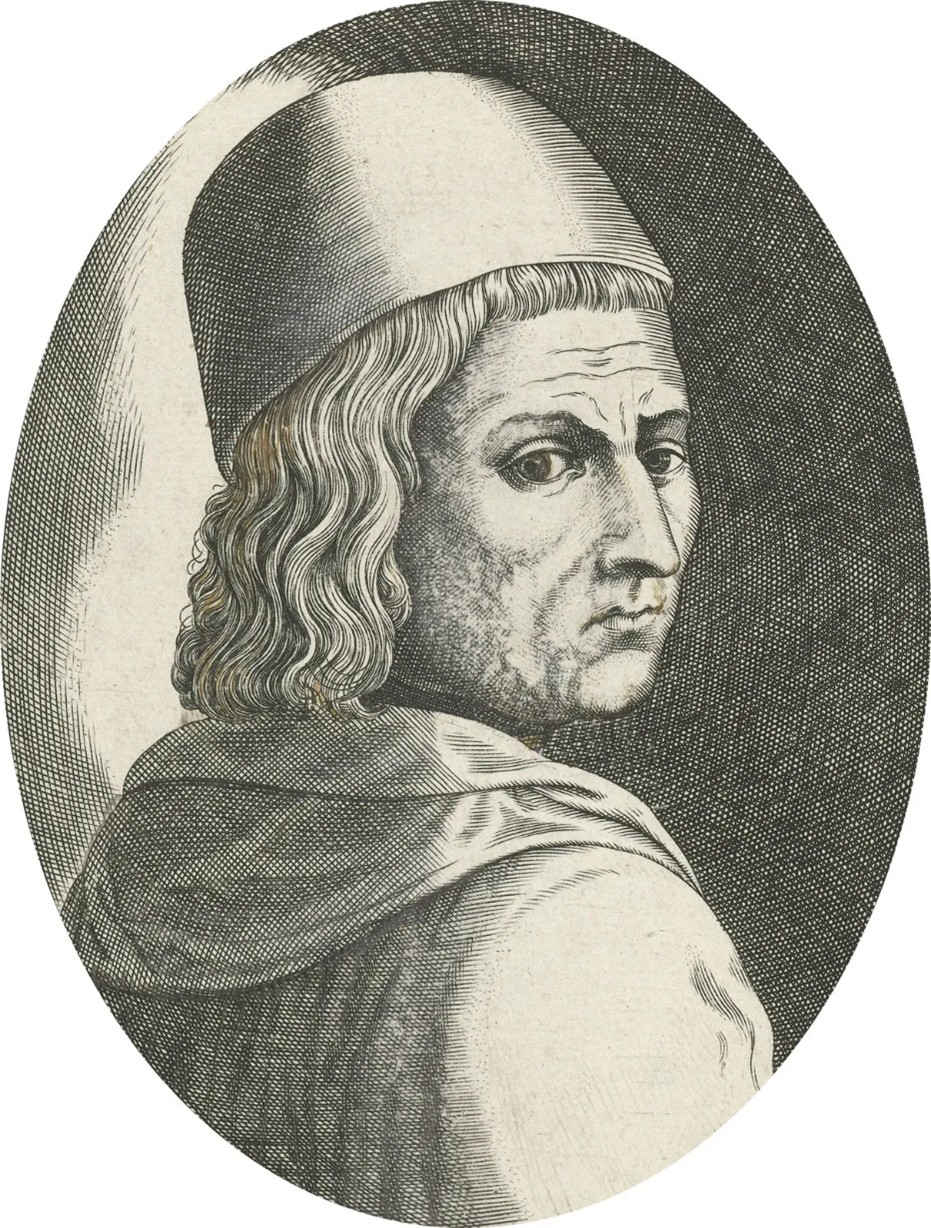
Indeed, it was known even at the time that Ficino hailed Zoroaster as the head of his hexad of Gentile sages because the neo-pagan Plethon had placed this figure at the head of his own pantheon in the ideal resurrected Hellenistic state. Plethon had made a strong impression in Florence and for Ficino to adopt the rudiments of his system is not exactly an indication of a disagreement.
“Both deny any form of religion. If anyone think to destroy by the simple preaching of faith an impiety so diffused among men and defended by such subtle minds, he will soon be refuted by the results. Stronger measures are needed: either divine miracles manifested on all sides or at least a philosophical religion to which philosophers will listen more readily and which will some day succeed in convincing them. But in these times it pleases divine Providence to confirm religion in general by philosophical authority and reason until, on a day already predestined, it will confirm the true religion, as in other times, by miracles wrought among all peoples.”
INQUISITION
The advocacy of Magick and Astrology in his works brought him closest to trouble with the Catholic Church. He was dragged by the Inquisition to Pope Innocent VIII on an accusation of heresy in 1489 on the accusation of being a witch; it was only by securing the combined services of Francesco Soderini, Ermolao Barbaro, and the archbishop Rinaldo Orsini that he narrowly escaped with his life. Ye he was defiant and wrote an Apology (in modern terms, a Defense) explaining he was only writing the views of the Ancients in text.
There are other contradictions in his thought to Catholic dogma. Ficino constantly references "the divine Sun", which he equates with the Platonic concept of the One, claiming it is the responsibility – and goal – of the "rational soul" to reacquaint itself with this realm of perfection. He claims part of the soul always exists, a heresy known as Origenism contradicting the Second Council of Constantinople’s conclusion that the soul is fully created at biological conception, further condemned shortly after Ficino’s death by the Fifth Lateran Council.
In addition, he believed angels (clearly messenger Demons and not the angels of the Bible) occupy a supernal intelligence of near-divine perception and serve as active intermediary mediators between humans and God that occupy a middle position, contradicting the Nicene position sourced from the Bible that only Christ is a mediator (1 Timothy 2:5). This is clearly sourced from Plato and Polybius contentions about the Demons, among others. He even went as far as to describe Plato as ‘divine’.
Other contradictions include the contention that God is in "all things", a view coming dangerously close to pantheism, a belief he was criticized for even during his lifetime. Ficino even alluded to this with a not-so-subtle paean to Zeus and Kronos in areas:
Deus est omne bonum, deus est omne verum. Adde quod deus amplitudo et plenitudo ipsa esto. Non video igitur cur non amplificet per cuneta seipsum et singula impleat…
Cur non potius, si absit per momentum id quod ipsum esse est, repente in nihilum ruituras? Sapienter Orpheus in Saturni hymno inquit: “ὃς νῦν κατὰ πάντα μέρη κόσμου γενάρχῃ”
[…]
God is every good, God is every truth. God is fullness and plenitude itself. I do not see, therefore, why He cannot multiply Himself through all things and fill each individual…Why wouldn’t things rush headlong rather into non-existence, if that which is being itself were absent for a moment? Orpheus declares with wisdom in his Hymn to Saturn, "You who dwell in every part of the world, prince of generation."2
The truth is that Ficino was a great infiltrator of the Catholic Church. His access to clerical circles including some of the Papal libraries scattered throughout Italy, the resources of fleeing Byzantine refugees and the endless financial and cultural resources of the Medici family allowed him to recreate the works of Plato and the structure of Plotinus in a cogent and striking manner that leaves modern historians puzzled as to their competency. Not only was this true, but Ficino attempted to build on the grounds of Plato and Aristotle with distinctive methods and forms of scholastic knowledge acquired in the Middle Ages.
In contrast to the modern interpretation that Ficino was attempting to strengthen the Church, he attempted to make links between the philosophy of Plotinus and the metaphysics of Christianity in order to undermine the latter, to make the theft obvious in plain sight. To that end, Ficino succeeded in convincing several intellectuals in Europe of the bankruptcy of Christianity, something that would immediately trigger a crisis of faith in Italian elite circles and set part of the stage for the crisis the Catholic Church would face in the next century.
PLATONIC ACADEMY
On the back of all of these developments, as his greatest achievement, Ficino established the Platonic Academy in Florence as a discussion group of no fixed address (much like the ministry of Socrates) with the support of Lorenzo de Medici who had attended Plethon’s lectures himself. It was estimated to have over one hundred members and operated clandestinely to revive the doctrines of Antiquity. His activities as a priest gave cover for this group.
Although Ficino was hailed as the greatest philosopher of his time, Battista Mondin in the History of Theology conveys that after the Reformation and the reorganization of Catholicism, Ficino was accused of being a ‘paganizer’ and his reputation was constantly attacked on this basis by pious theologians, leading to the marginalization of this excellent man in philosophical circles by the 17th century due to the ‘Counter-Reformation’ where serving Jews became the number one agenda once more.
Throughout the centuries, scholars simply labelled him as an inept re-iterator of Plato. The reinvention of him as a pious Christian playing it straight took place in the 20th century among American and German scholars who read his works at face value and tried to rehabilitate his reputation. Out of all the modern scholars, only the translator Charles Boer seems to understand the real inclinations of Ficino.
BIBLIOGRAPHY
1Oratio de laudibus medicine, Marsilio Ficino
2Platonic Theology, Marsilio Ficino
Commentaries on Plato, Marsilio Ficino
Letters of Marsilio Ficino
Marsilio Ficino: Platonic Theology, Michael J. B. Allen,
The Origins of the Platonic Academy at Florence, Arthur Field
CREDIT:
[TG] Karnonnos

 አማርኛ
አማርኛ العربية
العربية বাংলা
বাংলা Български
Български 中文
中文 Čeština
Čeština Dansk
Dansk Deutsch
Deutsch Eesti
Eesti Ελληνικά
Ελληνικά Español
Español Français
Français हिन्दी
हिन्दी Hrvatski
Hrvatski IsiZulu
IsiZulu Italiano
Italiano 日本語
日本語 Kiswahili
Kiswahili Magyar
Magyar Македонски
Македонски नेपाली
नेपाली Nederlands
Nederlands فارسی
فارسی Polski
Polski Português
Português Română
Română Русский
Русский Slovenščina
Slovenščina Suomi
Suomi Svenska
Svenska Tagalog
Tagalog Türkçe
Türkçe